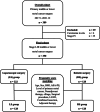Short- and long-term outcomes of robotic versus conventional laparoscopic surgery for middle or lower rectal cancer: a propensity score-matched analysis
- PMID: 40379827
- PMCID: PMC12084180
- DOI: 10.1007/s00384-025-04888-9
Short- and long-term outcomes of robotic versus conventional laparoscopic surgery for middle or lower rectal cancer: a propensity score-matched analysis
Abstract
Purpose: The potential benefits of robotic surgery (RS) for rectal cancer (RC) remain uncertain. The objective of this study was to evaluate the short- and long-term outcomes of RS compared to conventional laparoscopic surgery (LS) for stage I-III middle or lower RC.
Methods: This study retrospectively analyzed 350 consecutive patients with stage I-III middle or lower RC who underwent curative surgery from 2017 to 2021, employing propensity score matching (PSM) analysis.
Results: Of 350 patients, 128 patients underwent RS. After PSM, we enrolled 256 patients. Median follow-up was 59.8 months. Before PSM, significant differences were observed between groups regarding primary tumor site (p = 0.02). After PSM, no significant differences between groups were observed in terms of operative time, blood loss, conversion rate, intra-operative and postoperative complications, or number of lymph nodes harvested. After PSM, 3- and 5-year cumulative LR rates were 3.2% and 3.2% in the RS group, and 2.8% and 3.2% in the LS group, respectively. The cumulative distant recurrence (DR) rates in the RS group were 13.4% at 3-year and 15.1% at 5-year, whereas in the LS group, they were 14.9% and 18.7%, respectively. No notable differences in cumulative LR or DR rates were evident between groups. Furthermore, no notable differences were observed between groups regarding overall, cancer-specific, or recurrence-free survival according to stage.
Conclusions: RS appears to be viable and safe treatment approach for patients with middle or lower RC, offering short- and long-term outcomes comparable to those of LS.
Keywords: Laparoscopic surgery; Long-term outcome; Propensity score matching; Rectal cancer; Robotic surgery; Short-term outcome.
© 2025. The Author(s).
Conflict of interest statement
Declarations. Ethics approval and informed consent: This retrospective study received approval from the institutional review board of Osaka International Cancer Institute (approval no. 18033). This study was exempt from the requirement for informed consent. Animal experimentation was not conducted in this study. Competing interests: The authors declare no competing interests.
Figures





Similar articles
-
Short- and long-term outcomes of robotic and laparoscopic surgery in rectal cancer: a propensity score-matched analysis.Surg Endosc. 2025 Jan;39(1):184-193. doi: 10.1007/s00464-024-11374-w. Epub 2024 Nov 1. Surg Endosc. 2025. PMID: 39485536
-
Proficient surgeons enhance conversion rates and sphincter preservation in robotic rectal cancer surgery with comparable long-term outcomes: a comparative study with laparoscopy in a large-volume center in China.BMC Cancer. 2025 Mar 26;25(1):545. doi: 10.1186/s12885-024-13407-y. BMC Cancer. 2025. PMID: 40140799 Free PMC article.
-
Short-term outcomes of robotic-assisted versus conventional laparoscopic-assisted surgery for rectal cancer: a propensity score-matched analysis.J Robot Surg. 2022 Apr;16(2):323-331. doi: 10.1007/s11701-021-01243-2. Epub 2021 Apr 22. J Robot Surg. 2022. PMID: 33886065
-
Robotic surgery is associated with a decreased risk of circumferential resection margin positivity compared with conventional laparoscopic surgery in patients with rectal cancer undergoing mesorectal excision: A systematic review and meta-analysis.Eur J Surg Oncol. 2024 Oct;50(10):108538. doi: 10.1016/j.ejso.2024.108538. Epub 2024 Jul 14. Eur J Surg Oncol. 2024. PMID: 39053042
-
A Systematic Review and Bayesian Network Meta-Analysis: Short-Term and Long-Term Outcomes of Three Surgery Procedures Following Neoadjuvant Chemoradiotherapy for Rectal Cancer.J Laparoendosc Adv Surg Tech A. 2019 May;29(5):663-670. doi: 10.1089/lap.2018.0069. Epub 2019 Jan 16. J Laparoendosc Adv Surg Tech A. 2019. PMID: 30648922
References
-
- International Agency for Research on Cancer (2022) World Health Organization. Cancer today. Cancer fact sheets. Available at: http://gco.iarc.fr/today. Accessed December 11, 2024
-
- Corcione F, Esposito C, Cuccurullo D, Settembre A, Miranda N, Amato F, Pirozzi F, Caiazzo P (2005) Advantages and limits of robot-assisted laparoscopic surgery: preliminary experience. Surg Endosc 19:117–119. 10.1007/s00464-004-9004-9 - PubMed
-
- Jayne D, Pigazzi A, Marshall H, Croft J, Corrigan N, Copeland J, Quirke P, West N, Rautio T, Thomassen N, Tilney H, Gudgeon M, Bianchi PP, Edlin R, Hulme C, Brown J (2017) Effect of robotic-assisted vs conventional laparoscopic surgery on risk of conversion to open laparotomy among patients undergoing resection for rectal cancer: the ROLARR randomized clinical trial. JAMA 318:1569–1580. 10.1001/jama.2017.7219 - PMC - PubMed
-
- Simillis C, Tekkis PP (2019) Robotic versus laparoscopic surgery for rectal cancer: an evidence-based approach. Ann Surg 270:e57. 10.1097/sla.0000000000003156 - PubMed
Publication types
MeSH terms
LinkOut - more resources
Full Text Sources
Miscellaneous

